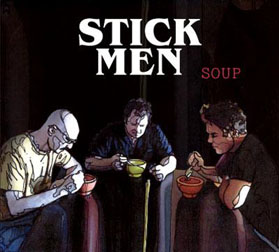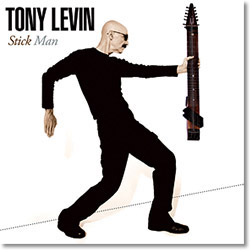Artists CDs
Tony Levin and Stick Men
Stick Men - Soup2010 CD, Papa Bear Records, $12  Some recordings are bound to make waves. Soup, the debut CD by the new band Stick Men, might just create a tsunami. Soup turns conventional ideas about rock bands on their heads, and churns up some surprising new musical pathways for The Stick in its wake. The band is a trio of Tony Levin and Michael Bernier both on Stick, and drummer Pat Mastelotto (on sticks, no less). This isn't just a first CD for this new trio, it's also the first time we get to hear Tony in a full-fledged composers' collaboration with another Stick artist. All 13 tracks have a hard metal edge, and occasionally veer into "atonal", primal thrashing. They rarely follow conventional forms, and frequently shift direction, introducing new themes and grooves in rapid succession. Even the tunes that slow things down a bit have a smoldering energy from the ever-present distorted Stick lines and Pat Mastelotto's battling drums and mysterious triggered samples. Comparisons to Tony's previous work with Peter Gabriel and King Crimson will be inevitable, I believe, and fans of those bands will surely find a lot to enjoy here, as there are many connecting points in sound, rhythm and orchestral timber. Tony's role as a composer and arranger in those earlier ensembles was well known, and his sensibilities seemed to focus on the overall sound over and above isolated notes and lines. His signature sound has always been warm, punchy and decidedly "analog", even when opting for a serious dose of bass overdrive or a crunchy rhythm part. The main thing that separates Stick Men from these earlier groups is that all the parts you'd expect from electric guitar and keyboards are now being done on dual Sticks by Tony and Michael. The sounds they come up with are often truly "guitar-like," even without a picking hand. Michael Bernier's lead lines are blazingly expressive, rivaling some of the best lead guitarists. He may just do for two-handed Stick melody what Tony did for two-handed Stick bass. Both players are fast, precise, versatile in every register, and they make it all look and sound easy. In live performance, these two Stick artists trade roles frequently, Michael jumping on the bass as Tony plays overdriven rhythm and lead parts, then vice versa. Each player can focus both hands in any musical register with laser like concentration. Thus the whole range of the instrument is covered all the time, and even the most ambitious of the material on the CD has been making it into their live performances. One of the hallmarks of Tony's career must be that he has never stopped searching for new sounds, new sub-techniques and new musical roles. This desire to explore new territory is at the core of what makes Stick Men work so well. Tony's and Michael's collaboration began as an exchange of techniques and ideas. Even though Michael was not the first player to bow the Stick's outer strings or the heaviest bass string that sits highest at the center, he is the first I've heard to develop this technique far beyond "novelty" status. Where other players have relied on E-Bows and volume pedal swells to approximate orchestral strings, he manages to create everything from high trilling strings to the deep viola-register lines on "Firebird", and the haunting sounds of the Middle Eastern rabab on "Inside the Red Pyramid", using the real thing, the bow with all its lyrical control and dynamics. It's an exciting new development in Stick technique that's sure to inspire imitators. Both Tony and Michael use the standard "Stickup" module, and both play through separate guitar and bass amps. But their setups diverge in one key way. Michael uses a lot of digital processing (modulation effects, pitch transposition and filtering) before running into his amps. Tony's signal path is all analog - warm, chunky, full and articulate. Both of them use a wide variety of tones with volume swells, filters, and lots and lots of distortion. Did I mention they use a lot of distortion? This has got to be the "heaviest" Stick music ever created, and a bit mind warping. So let's dig in... From the first minute of the CD, it's clear that "Soup" is no ordinary consommé. It comes at you with relentless energy, shifting textures, thunderous grooves and explosions of intensity. This is the primordial soup of a nascent musical planet, ionized by lightning, and giving rise to a new life form - a band that can really rock out without any guitars. The opener and title song finds Tony and Michael "rapping" about supercolliders over a funky bass harmonic and drum groove, which alternates with an apocalyptic heavy metal instrumental section. Michael's solo is positively searing. This is music that will surely appeal to fans of guitarist Steven Wilson, leader of Porcupine Tree, who mixed this track. The other two additional "Soup chefs" are Tony Lash, and Larry DeVivo, with the band mixing "Firebird" themselves. (I think you'll agree, it's the perect number of cooks...). Next comes the three-part "Hands", the first of two suites on the record. Initially, "Hands" recalls the high-intensity guitar polyrhythms of Thrak-era Crimson before settling into a primal drum and "noise" backing track for Tony's mask-filtered vocal. "Hands" hints at what's to come, with rapid-fire two-handed arpeggios, resounding bass notes and crashing drums. "Fugue", with chorused chords, swelling "synth" pads and ska/reggae/dub bass and drums is reminiscent of The Police, that is, except for the high-speed, percussive, two-handed bass part that occupies the foreground. It's the kind of part that could only be played by two hands tapping in tandem (as with Tony's work with Liquid Tension Experiment). "Scarlet Wheel", the closest thing to a ballad on the record, builds on Tony's classic percussive Stick bass sound plus swirling mallet percussion. It's a chance to rest up a bit before climbing to the apex of the album - four movements from Igor Stravinsky's "The Firebird Suite". While many progressive rock bands have covered works from the classical repertoire, this can frequently come off as an adaptation of the music to fit the band's established style, and the pieces are often less harmonically adventurous than the original score. Stick Men, however, isn't just a band, it's also an orchestra with all three members making the most of their full-range instrumental pallets and virtuoso chops. Thus these three "Stick Men" approach "Firebird" from a different vector, defining the band through a truly original interpretation of this challenging music, rendering it faithfully, yet in a completely contemporary style. They are not merely performing their "take" on some famous classical composition, rather, they manage to put a whole new perspective on Stravinsky's music. In the interest of not giving too much away, it's safe to say that fans of this piece will be pleasantly surprised to hear it re-imagined with such sharp discipline, and those of us who don't know Firebird can discover why this influential 20th-Century masterpiece is still ahead of it's time a hundred years later. (Yum!) Please, Sir, may I have some more? Track Listing (all songs written by Stick Men, except "Firebird", by Igor Stravinsky) Soup Hands - part 1, 2, 3 Inside the Red Pyramid Fugue Sasquatch Scarlet Wheel The Firebird - part 1,2,3,4 Relentless Sample TracksFor more information about the band's touring and to hear sample tracks from the CD visit:www.myspace.com/tonylevinmusic. Soup is now available from Stick Enterprises. |
Tony Levin - Stick Man2007 CD, Papa Bear Records, $12. Tony Levin's first Stick-centered solo release. Review by John Collinge,
Progression Magazine With an album like this coming from Stick maestro Tony Levin, who misses King Crimson? (Robert Fripp, take notice - you've been outdone by one of your own!) This is definitely Levin's most "Crimson-esque" release, all snappy, percolating, angular and egdy, and addictive as hell. Opening track "Welcome" has that sense of malevolent swing with Adrian Belew-style angst-y/shouted vocal evoking latter-day Crimson. Amidst the technically dazzling Stick workouts Levin also tosses in some engaging vocal tracks, the cooly atmospheric "Slow Glide" and the beautifully Melodic "Rivers of Light." |
